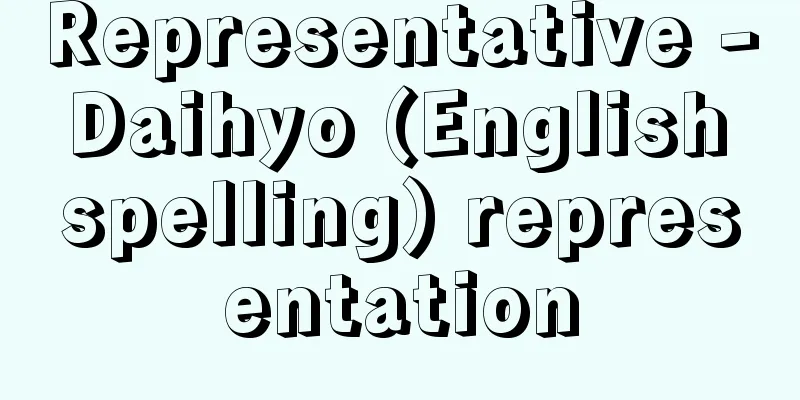Representative - Daihyo (English spelling) representation

|
A representative is a person or group that is regarded by all members of a community as the entity that realizes the unified will of the entire community, and is permitted to act freely without any restrictions. Typical examples are the monarch in a monarchy and the parliament in a democratic country. This concept of representation became particularly important in history and politics when the civil revolution triggered the parliament to represent the will of the people instead of the monarch. Estates assemblies also existed in the Middle Ages, but in these cases, representatives of the clergy, nobles, and commoners were merely representatives of their respective classes, and acted under a so-called binding delegation, in which they could only participate in decisions on matters delegated to them by their respective classes. For this reason, estates assemblies were also known as the assembly of the tribes. However, after the civil revolution, as modern parliamentary systems were established in various countries, it began to be said that members of parliament should act as representatives of all citizens, regardless of their affiliation or status, and this is where the modern concept of representation was established. Article 43, paragraph 1 of the Constitution of Japan states that "Both Houses shall be composed of elected members, representing all the people." This means that members of the Diet should not pursue only their own interests, or the interests of their constituencies or any group to which they belong, but should act to realize the interests of all the people. The first person to theorize the principle of this modern concept of representativeness was the Englishman Hobbes. Seeing the tragic situation where the Royalists and Parliamentarians were divided into two factions, Hobbes argued that in order to ensure the safety of human freedom and life, a community in which people could live under some kind of unified will should be established, and he advocated that all members should enter into a contract to establish a common power, under which they should elect a representative, i.e., a sovereign, and live safely under the laws made by the representative. Thus, the representative he spoke of was obligated to ensure the safety of all members of the community, while the members who elected the representative were obligated to voluntarily obey the laws made by the representative. Thus, the power exercised by the representative was elevated from mere violence to an authority that realized the interests of all members. Rousseau expressed this by saying that the people are called sovereigns in the sense that they constitute a sovereignty, and that the people are called subjects in the sense that they obey the laws made by the representatives. In modern times, based on Locke's view that parliament is the representative body of the people, in most countries the representatives of the people are identified with the national parliament. The question of representation therefore boils down to whether the parliament truly represents the will of the people. [Hiroshi Tanaka] Source: Shogakukan Encyclopedia Nipponica About Encyclopedia Nipponica Information | Legend |
|
ある共同社会の全成員から、共同社会全体の統一的意志を実現する主体とみなされ、なにものにも拘束されず自由に行動することを認められた人または団体をいう。君主制国家における君主、民主制国家における議会などがその典型例。このような代表概念が、歴史上・政治上とくに重要になったのは、市民革命を契機にして、君主にかわって議会が国民意志の代表とされた時点においてである。中世においても身分制議会が存在したが、この場合には、僧侶(そうりょ)、貴族、庶民の代表は、それぞれの身分の代表にすぎず、彼らは各身分によって委任された事柄についてだけ決定に参加できるという、いわゆる拘束的委任の下に行動していた。このため、身分制議会は別名等族会議ともよばれた。しかし、市民革命後、各国において近代的な議会制度が確立されていくなかで、国会議員は所属・身分のいかんを問わず全国民の代表として行動すべきである、ということがいわれ始め、ここに近代的な代表概念が成立した。日本国憲法第43条1項に「両議院は、全国民を代表する選挙された議員でこれを組織する」という規定があるが、これは、国会議員は、自己の利益や選挙区あるいは自己の属するなんらかの集団の利益だけを追求するのではなく、全国民の利益を実現するように行動せよ、という意味を含んでいる。 こうした近代的な代表概念の原理を最初に論理化したのはイギリスのホッブズである。彼は、国王派と議会派が真っ二つに分裂して闘っている悲惨な状況を眼前にして、人間が自由と生命の安全を確保するためには、なんらかの統一的意志の下で生活できる共同社会を設立すべきであると述べ、全成員が契約を結んで一つの共通権力を設け、その下で代表、つまり主権者を選んで、代表のつくる法律の下で安全に生きよと説いた。したがって、彼のいう代表は、共同社会全員の安全を確保する義務を課され、他方、代表を選出した成員は代表の制定した法律に自発的に従うよう義務づけられていることになり、ここに、代表の行使する権力は、単なる暴力ではなく、全成員の利益を実現する権威へと高められた。このことを、ルソーは、主権を構成するという点で人々は主権者とよばれ、代表の制定した法律を守るという点で人々は臣民とよばれる、と表現している。現代では、ロックが議会を国民の代表機関としたことに基づいて、ほとんどの国々で国民代表は各国議会と同一視せられている。したがって、代表をめぐる問題としては、はたして議会が全国民の意志を真に代表しえているかどうかという点に帰着するであろう。 [田中 浩] 出典 小学館 日本大百科全書(ニッポニカ)日本大百科全書(ニッポニカ)について 情報 | 凡例 |
>>: Daihi no Senrokubon - Daihi no Senrokubon
Recommend
Terebratalia coreanica (English spelling)
… As mentioned above, the living brachiopoda are ...
Ḥayfā (English spelling) Hayfa
…Population: 252,000 (1996). In Arabic, it is cal...
Electrodialysis - Denki Touseki
When dialysis is performed on a colloid or polyme...
Color - Iro (English spelling) color, colour (English), Farbe (German)
Color is not an attribute of an object or light. C...
Geochelone radiata (English spelling)
… [Takahiro Matsui]. … *Some of the terms mention...
mark banco (English spelling) markbanco
…Under these circumstances, people would rather r...
Edaphosaurus (English spelling)
A primitive reptile belonging to the pelycosaurs t...
Tiger shark (English name) Galeocerdo cuvier
A marine fish of the Carcharhinidae family in the ...
Opuntia cactus - Opuntia
…In the early stages of growth, they have small f...
Shibue Chusai
1805-1858 A physician and Confucian scholar in th...
anchor
〘Noun〙 (anchor)① The last runner or swimmer in a r...
Bai Qi; Pai-Ch`i
[raw]? [Died] King Zhao 50 (257 BCE) A military co...
Overture - Jokyoku (English spelling) overture
An instrumental piece of music performed as an int...
modern art
…In the face of this situation, a movement callin...
Havel (river) (English spelling)
A right bank tributary of the Elbe River that flow...


![Nawa [town] - Nawa](/upload/images/67cc69462d708.webp)






